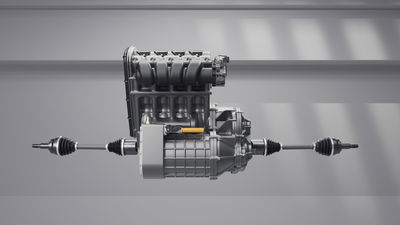The 2800 Bertone Spicup Is A Forgotten Piece Of BMW History

You’d be forgiven for pondering in confusion at your first glimpse of the image above. Yes, it has kidney grilles and a BMW badge, but other than that, it looks nothing like anything else the Baravian car maker has ever put together.
There’s a good reason for that: the car - the 2800 Spicup - was actually the work of Bertone. And despite the name and the door count, it isn’t based on an E9 2800 CS. Instead, Bertone used the E3 2500 as a starting point, cutting down the wheelbase and building an unusual body on top with a sliding Targa roof. The name - an awkward portmanteau of spider and coupe - references the latter feature.
The roof is just one peculiar feature of many. Just take that bonnet as an example: it has a gaping hole in the middle, through which the 2800 CS 2.8-litre straight-six protrudes. It was the only way the bigger engine would fit in the Spicup’s low snout.
This nose slopes down, partially hiding the headlamps under two flip-up covers. It’s this that gives the Spicup a front-end aesthetic similar to that of the Alfa Romeo Montreal, another Bertone-designed car which was shown in concept form two years before the quirky BMW’s reveal.

1969 served as the single Spicup prototype’s brief moment in the sun. It made its debut at the Geneva Motor Show, going on to enjoy a smattering of public appearances finishing with the Frankfurt Motor Show. It proved to be the only example of the car ever built, with BMW electing not to put the curiously-styled brute into production.
That wasn’t the end of the car’s story, however. It passed into private ownership in the Netherlands and was even granted road registration. It went on to clock 100,000km, a feat no doubt made possible by the conventional E3 and E9 guts hiding under the weird and wonderful bodyshell. In that time the lurid green interior ended up painted black, while the green exterior was resprayed in orange.
The Spicup - surely one of the most well-used prototypes in existence - went into storage in the 1980s, and wasn’t seen again for another 20 years. It was snapped up by a collector in 2008 and sent to Milan-based Carrozzeria Granturismo for an extensive restoration.

Being a one-off car, the 2000-hour restoration process was far from simple. Many parts - including the floorpan, sills, and doors - had to be rebuilt from scratch. The original rear bumper was, believe it or not, made from wood, and had been “ravaged by termites,” auction house Bonhams said in 2011.
The black paint was removed from the interior and the rejuvenated bodyshell finished in green, returning the Spicup to its original spec. The finished car was shown off at the 2009 Concorso d’Eléganza Villa d’Este, looking just as delightfully weird and attention-grabbing as it did back in 1969.

Despite being a lesser-known part of BMW’s history, the Spicup prototype managed to fetch a cool €460,000 when it was auctioned in 2011. It now resides at the BMW Museum in Munich, no doubt befuddling every visitor who passes by.
Sources: Autobild, Bonhams, Supercars.net














Comments
Friend: Is it green?
Me: Yes. Very
i see a cheeky TG reference there
Looks like Porsche 914 and Corvette C2 had a baby.
And Fiat X1/9 which was also designed by Bertone
(Null)
This is like a tier or two angrier than the Capri
heavy breathing
let her rip taterchip
I love that green
Alfa Romeo: Ok so basically…
im am alfa
When people want the world to go green
It looks dissapionted
Not one Bertone’s best designs.